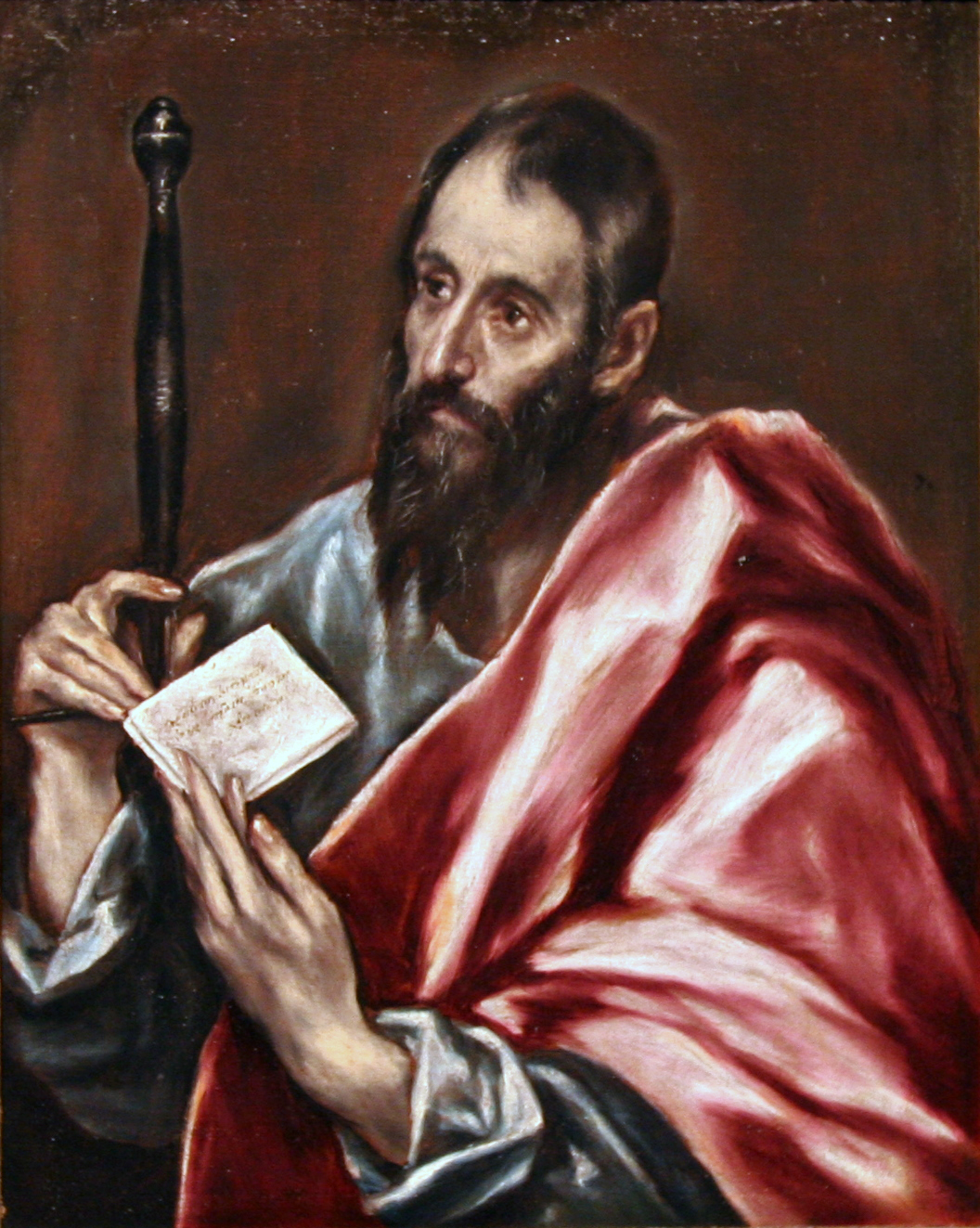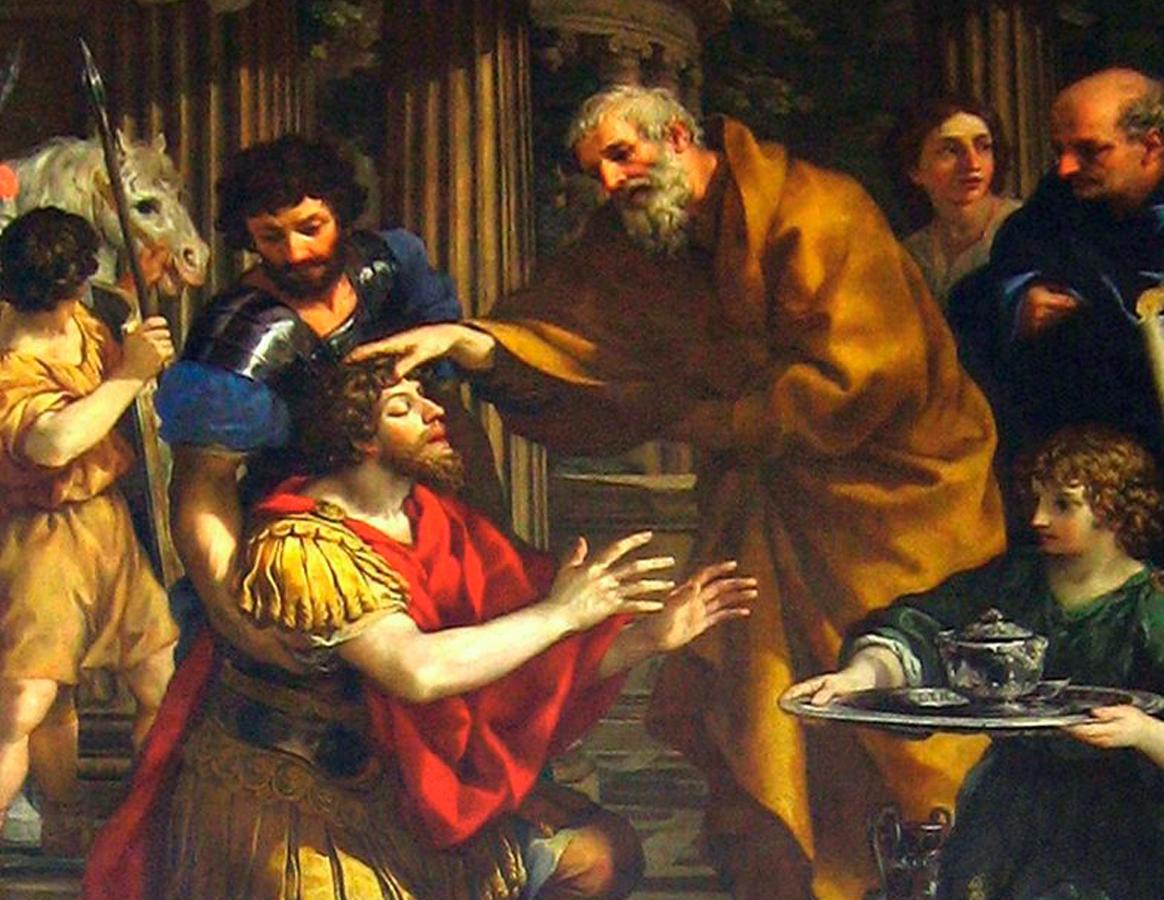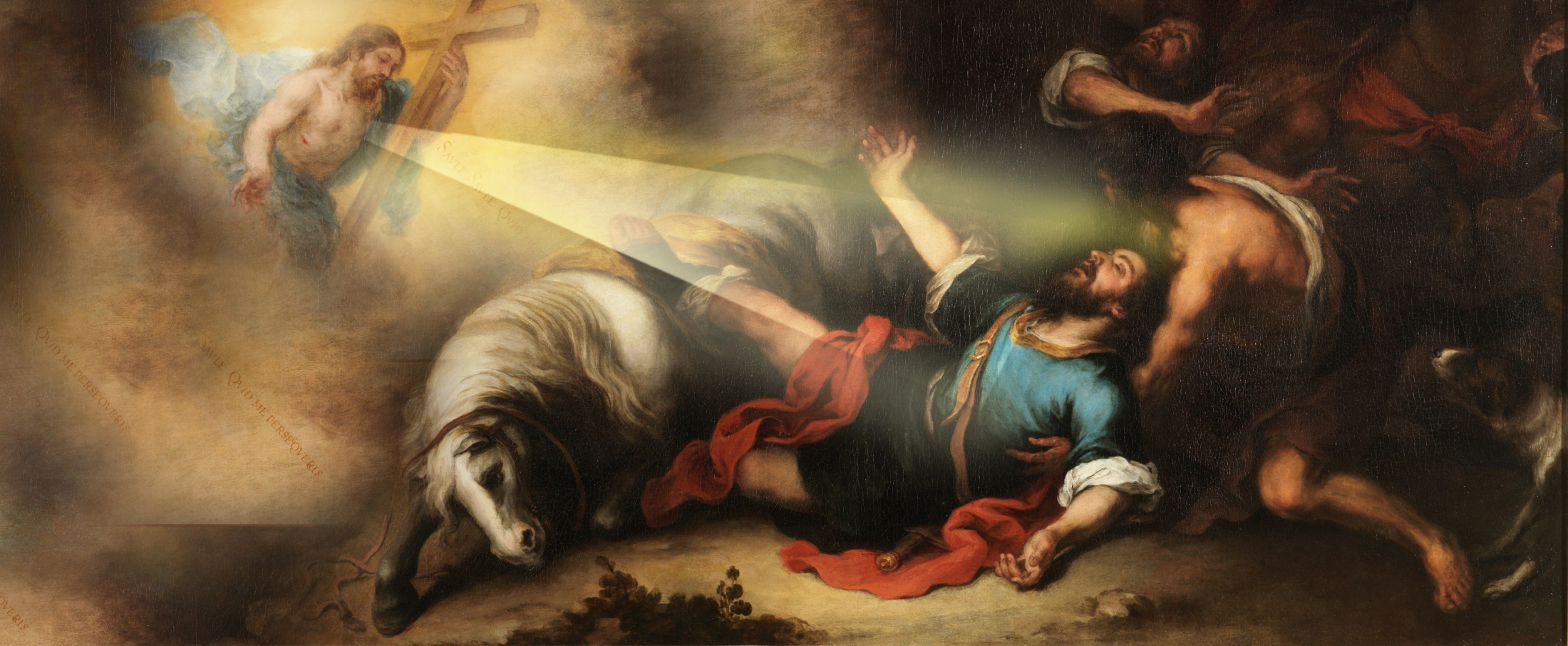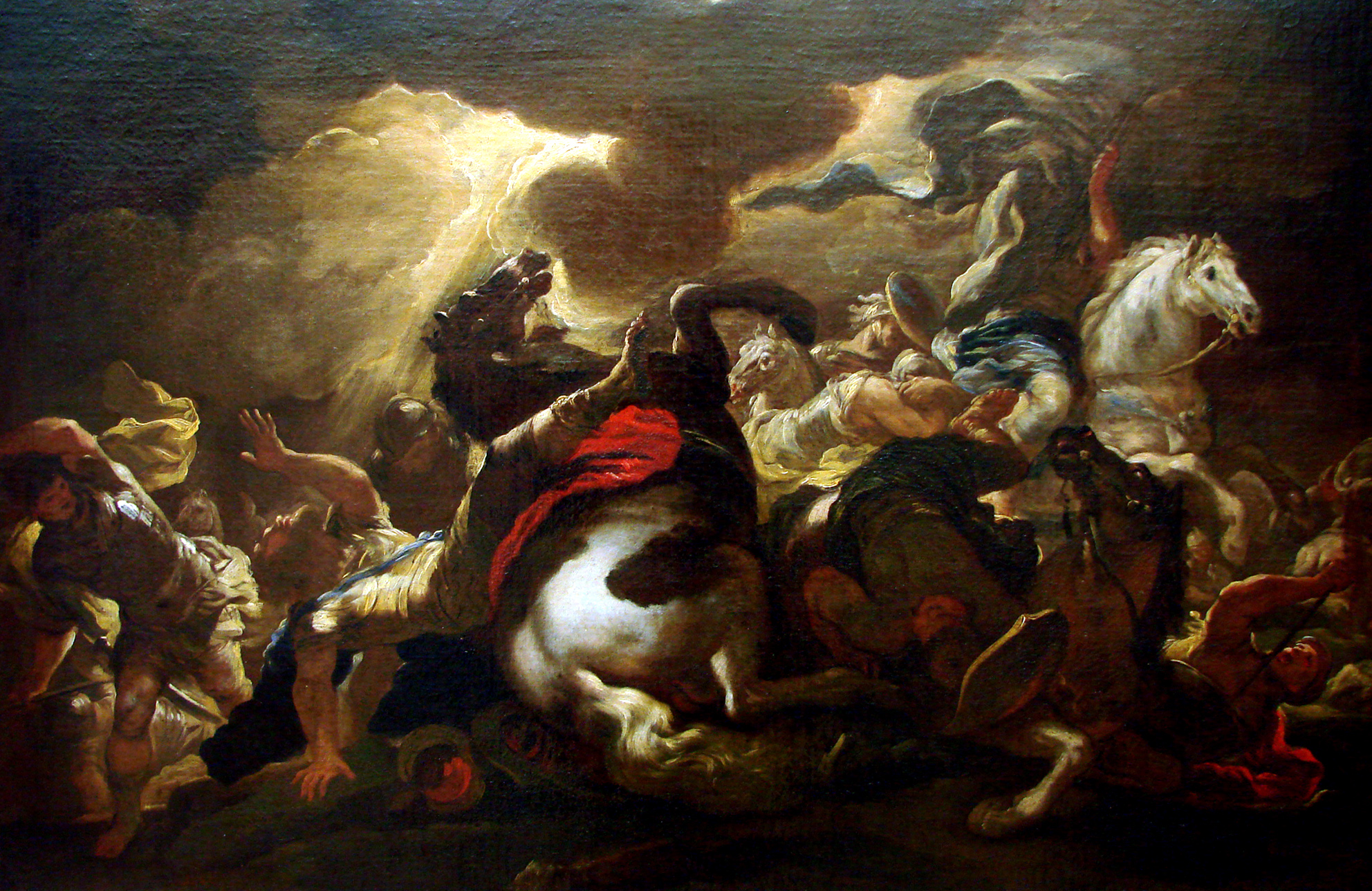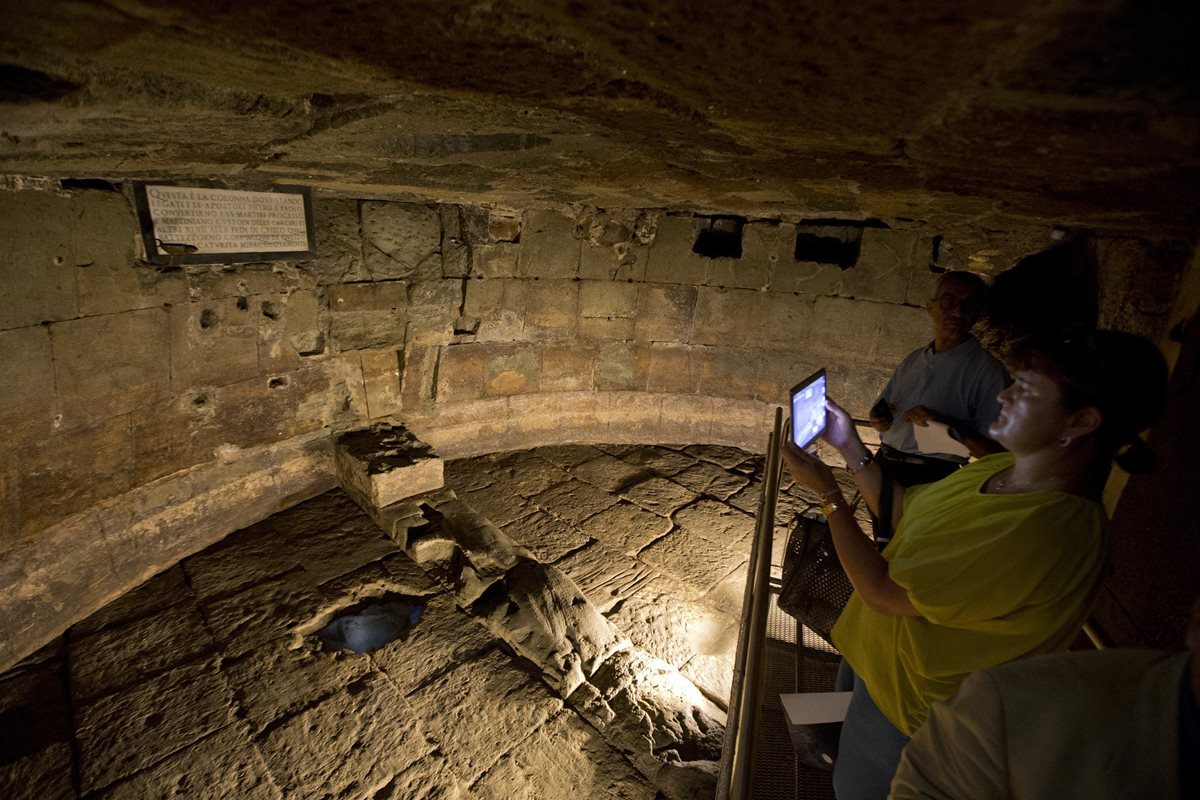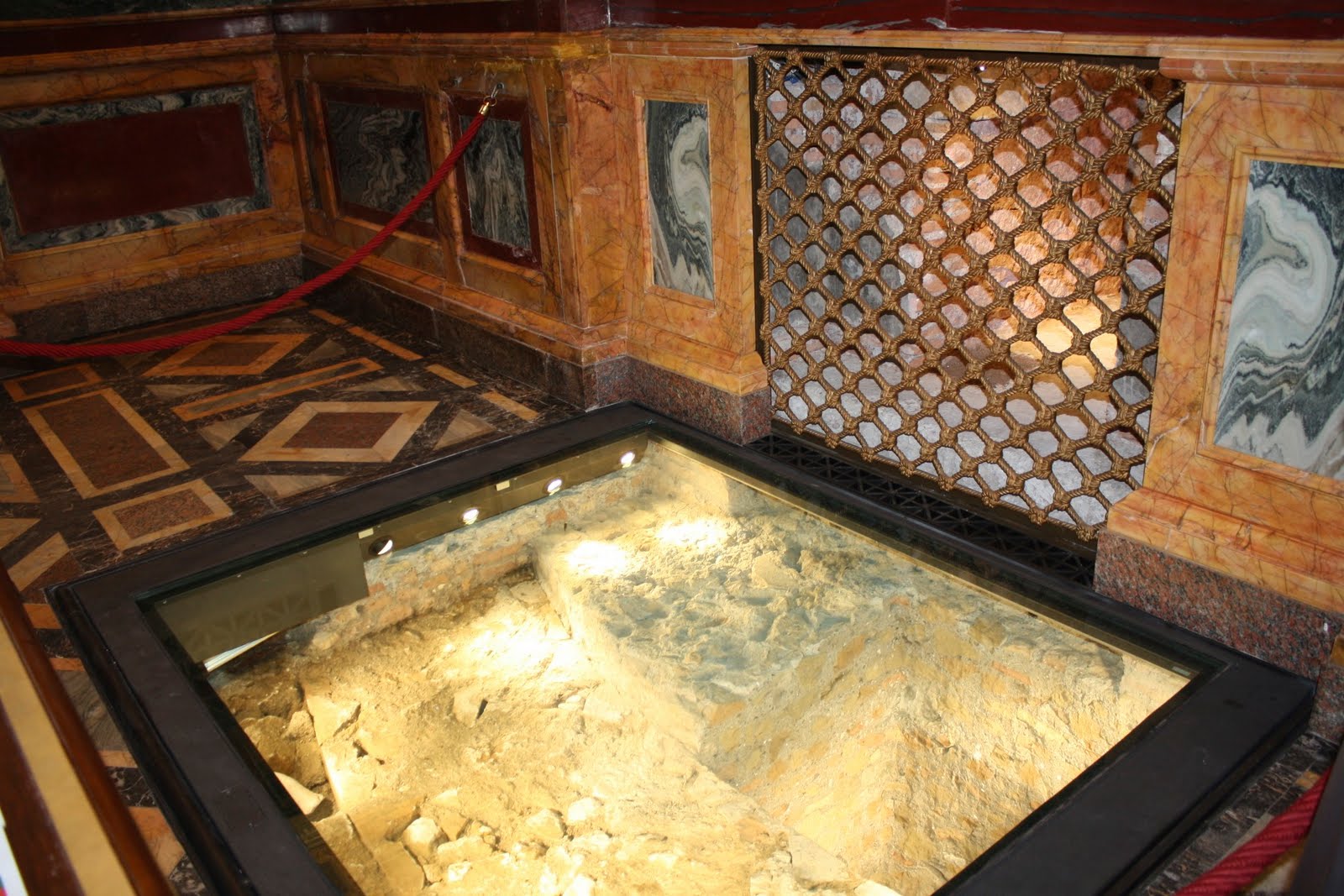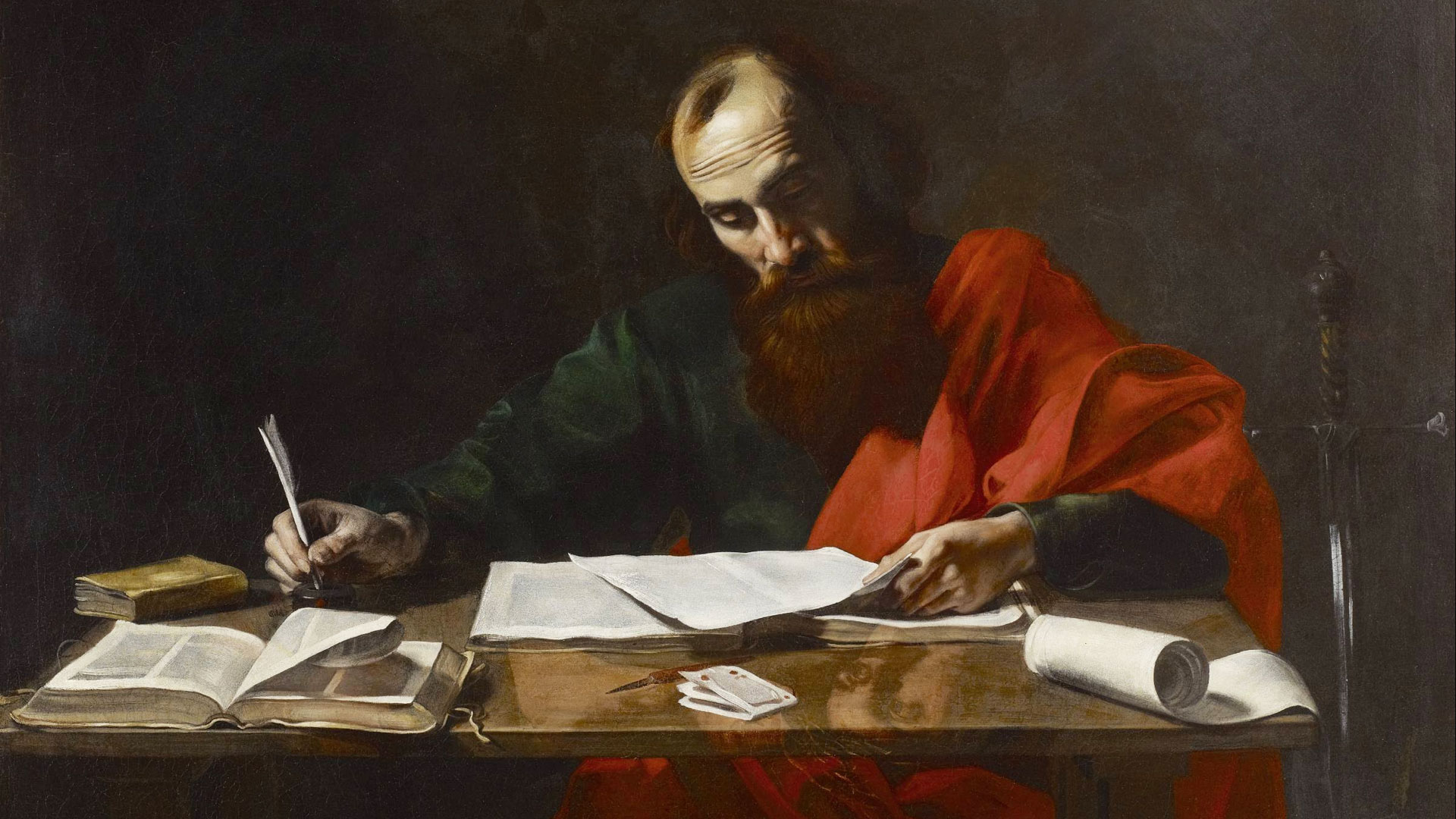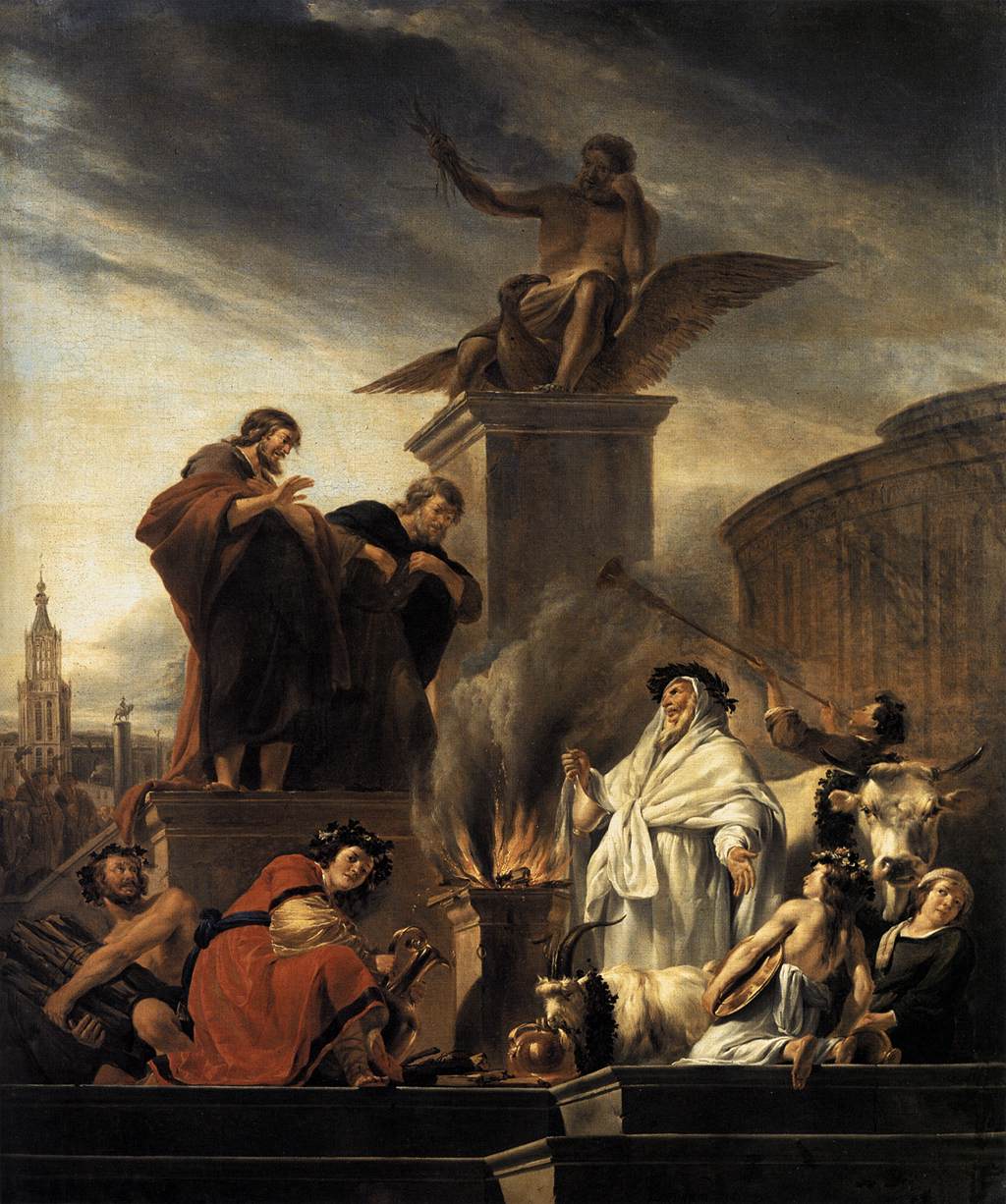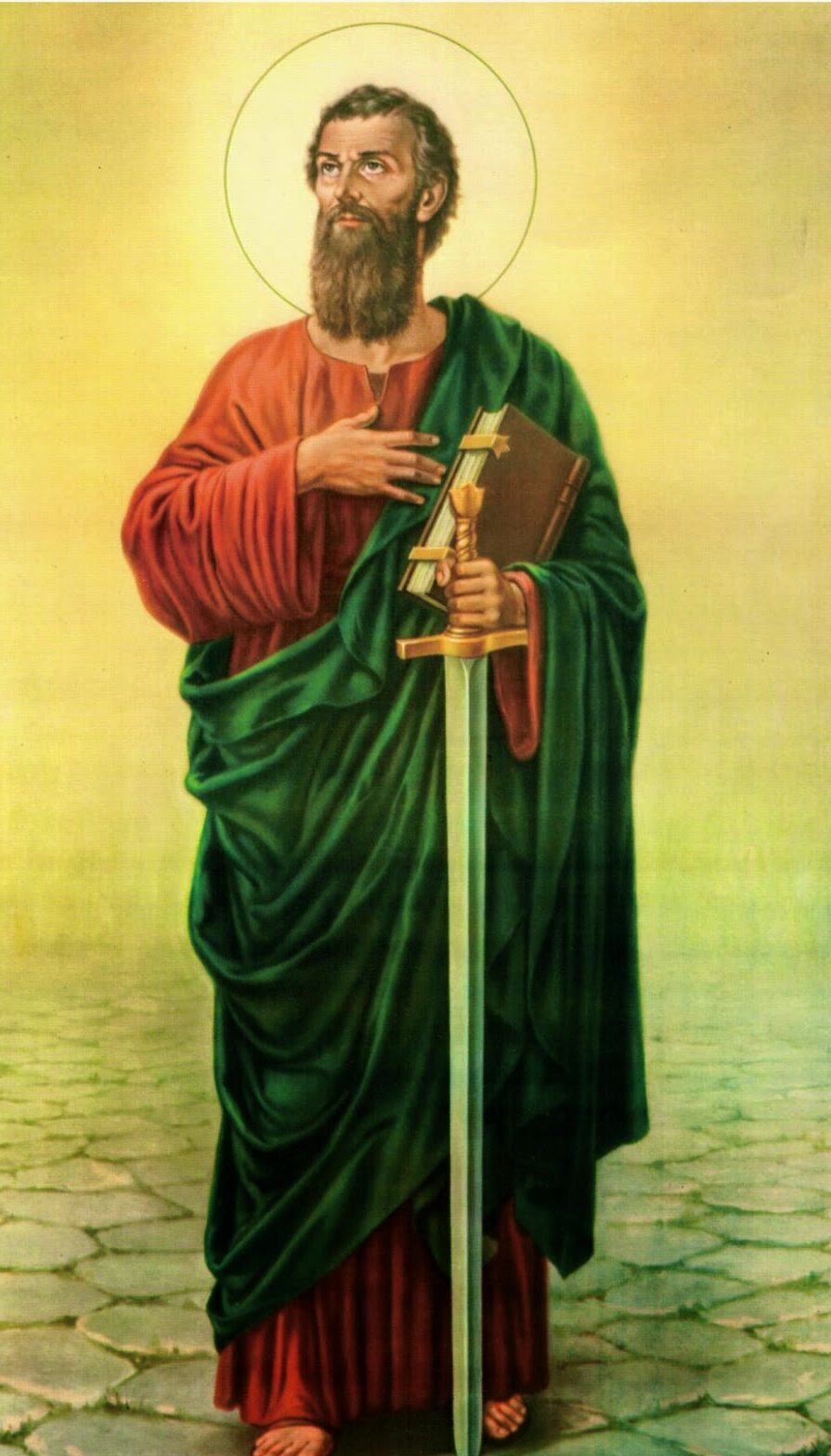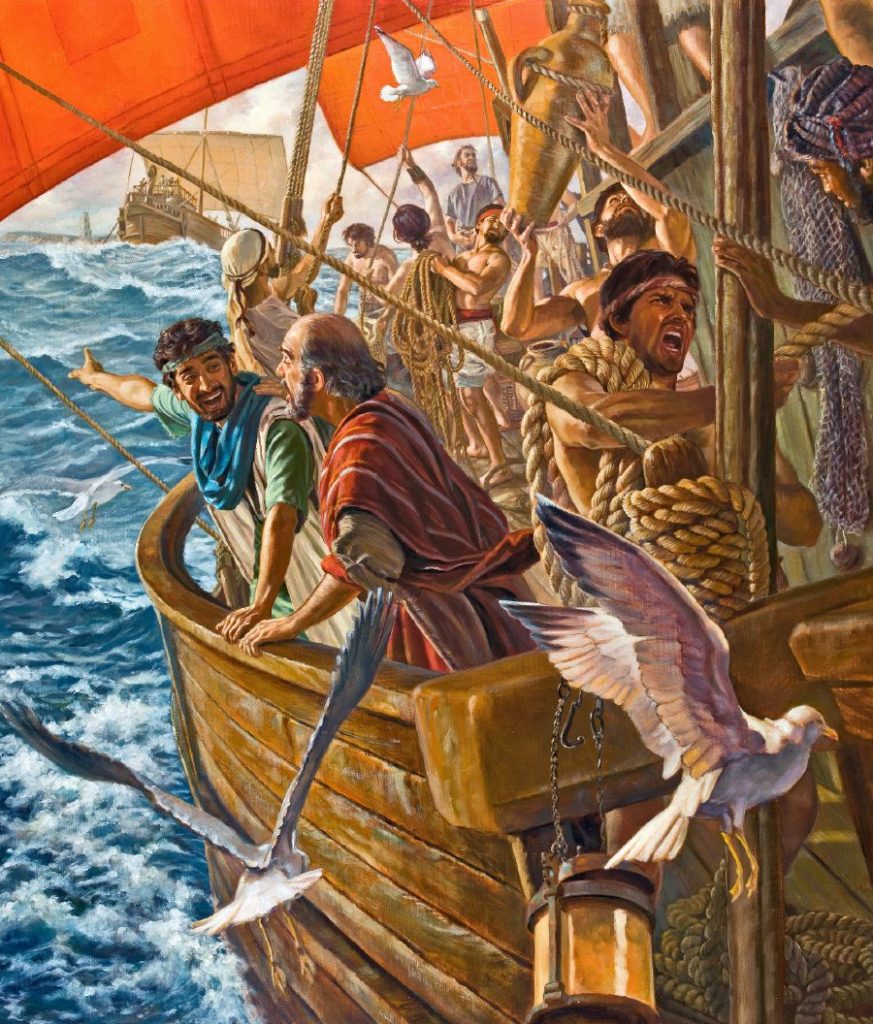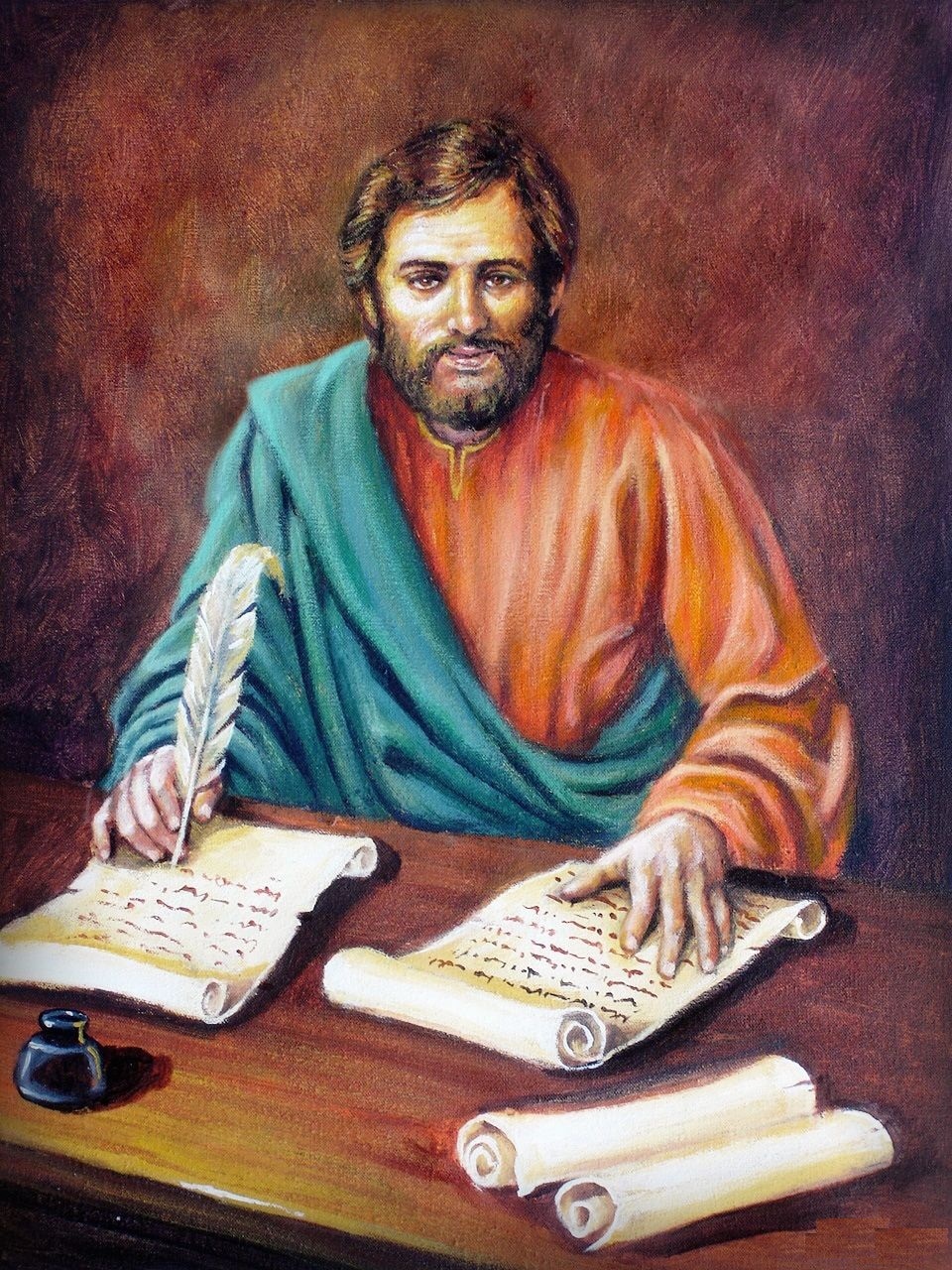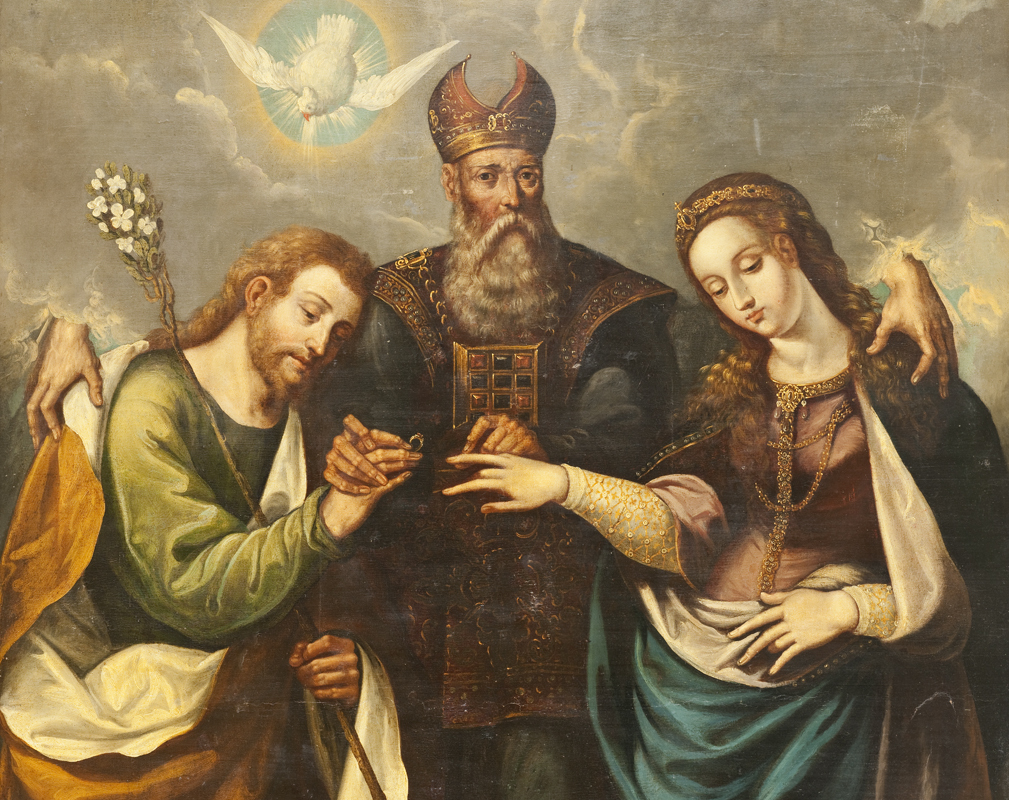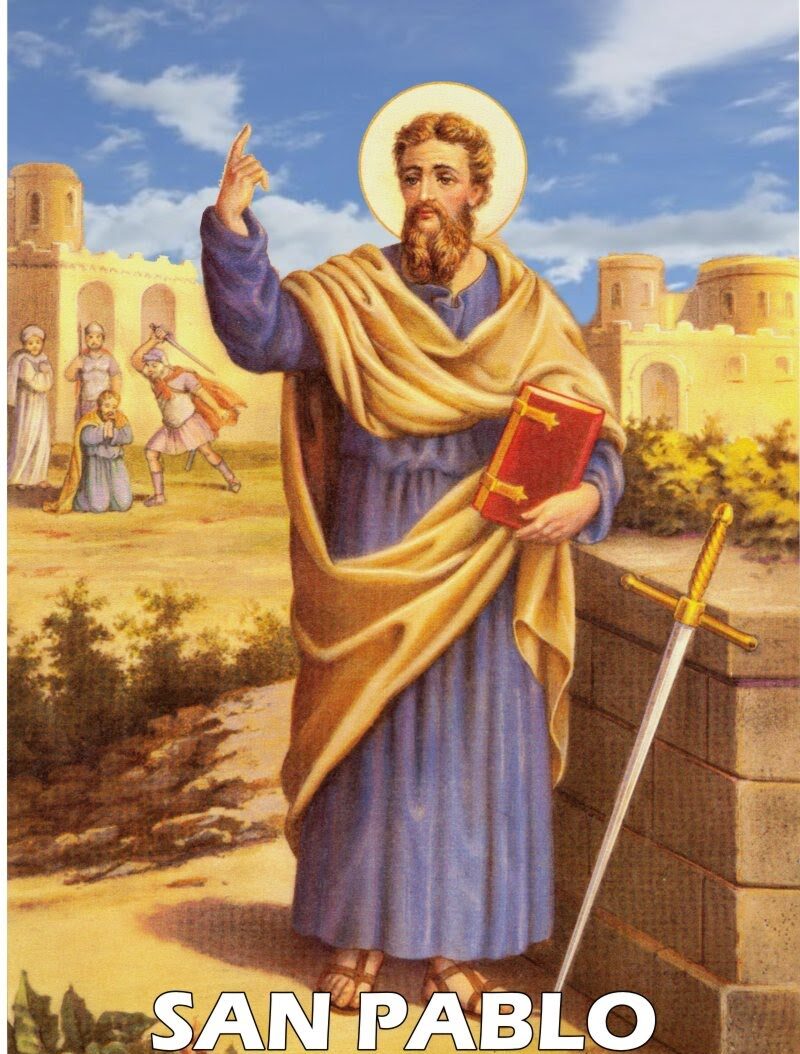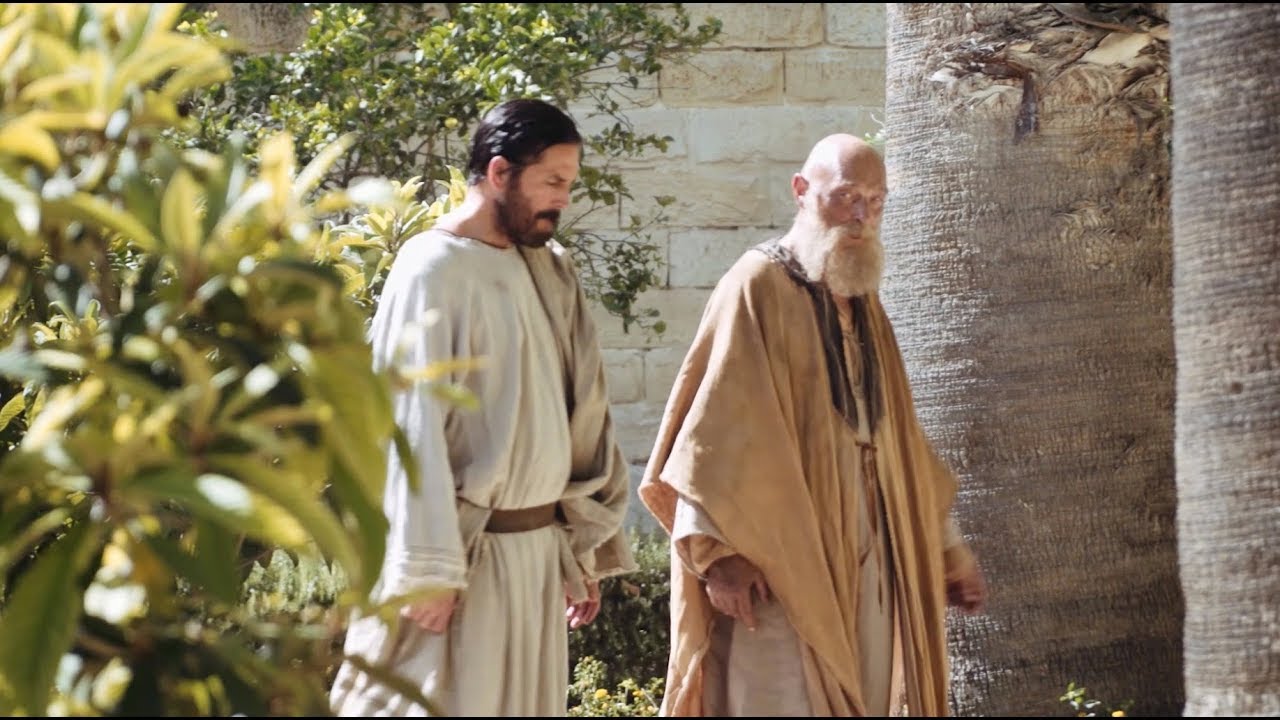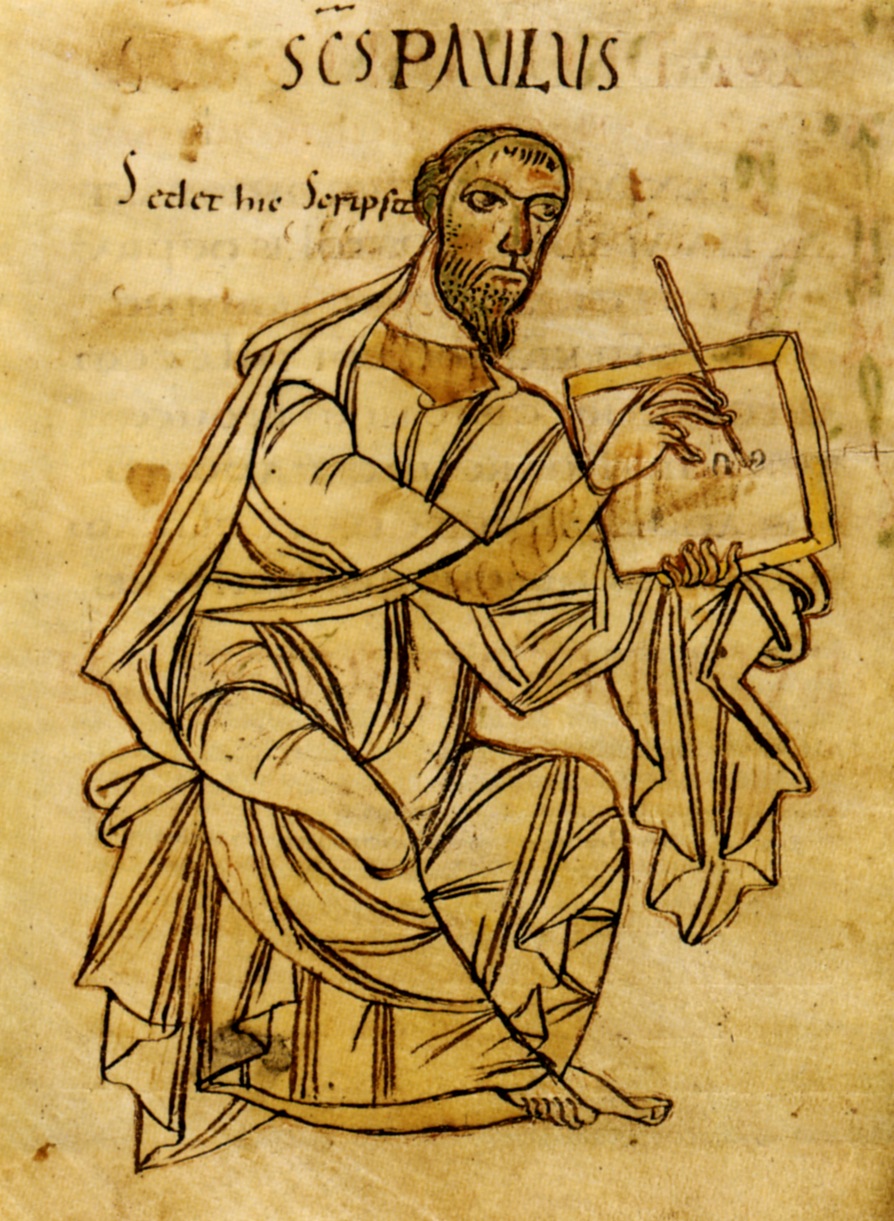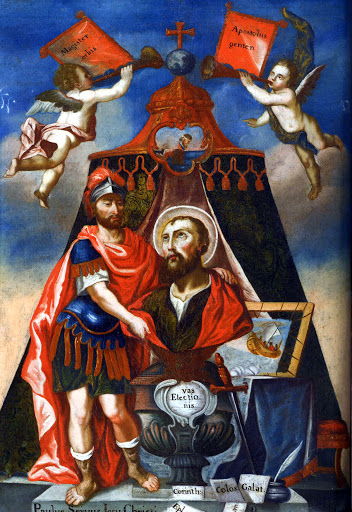Saul of Tarsus is the Jewish name of the one who after his conversion became Saint Paul the Apostle. He was not one of the close disciples of Jesus, rather he persecuted Christians until Jesus Christ appeared before him, to see why he persecuted his followers, but if you want to know his life, continue reading this article.
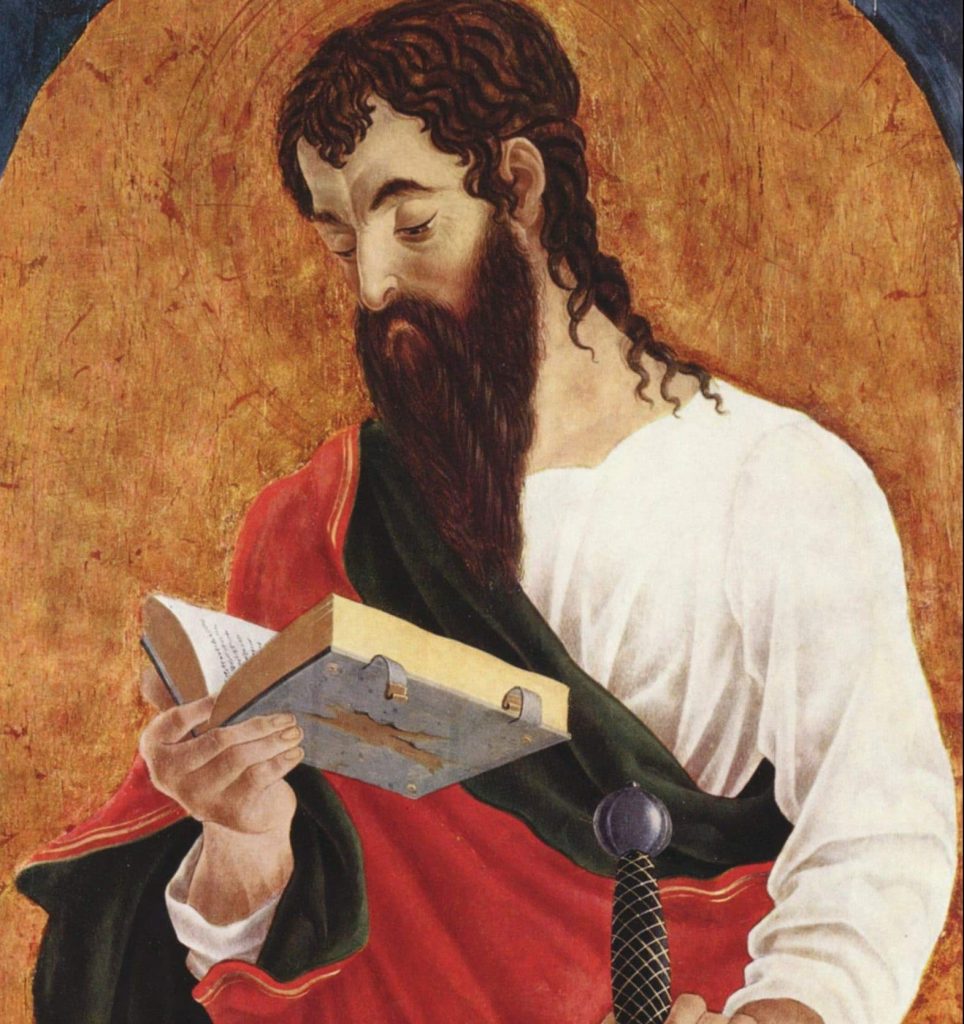
Saint Paul the Apostle
His first name was Saul of Tarsus, a man of Jewish origin, who is believed to have been born in Cilicia around the year 5 or 10 after Christ, in the city of Tarsus, which today would be Turkey. Despite having a Jewish origin, he grew up in the Roman world, and like everything in his time he used a kind of praenomen that was Saul, his Jewish name that means "invoked" and a cognomen, which he used in his epistles, Paulus, who was his Roman name.
He preferred to call himself by his Roman name Paulus, which means "Little One." When the translation is made into Greek, it is written as Paulos, in which the name was never changed, but it was common to use two names, as was the case with him. The Roman name of Paulos, corresponds to the Roman gens of Emilia, it is believed that he had a Roman citizenship for having lived in Tarsus or that one of his ancestors took that name. In the Acts of the Apostles he is referred to as "Saul, also called Paul."
The truth is that once he decides to be an instrument or servant of God, he came to be considered someone small before God, but whose mission was great for God's work. When he was imprisoned, he wrote an epistle to Philemon around the year 50 after Christ where he already declared himself an old man, at that time in Rome a person of 50 or 60 years old was already considered old, so he is contemporary with Jesus of Nazareth.
Saint Luke affirmed that he was originally from Tarsus, his mother tongue was Greek, since he had been born there and that he was fluent in this language. Paul used the Septuagint, a Greek translation of the texts of the Bible, a text widely used in ancient Jewish communities. All these features suggest that he has the profile of a Jew from the Diaspora who was born in a Greek city.
Tarsus at that time was a very rich and important city, it was the capital of Cilicia since 64 BC. It was located in the foothills of the Taurus mountains and on the banks of the Cidno river, which flowed into the Mediterranean Sea and where you could have a port in Tarsus.
As a city it was of great commercial importance as it was one of the cities on the Syrian and Anatolian trade routes, and a center or school of Stoic philosophy was also located there. This city granted Roman citizenship by birth, hence he was a Roman citizen of Jewish parents.
In the Acts of the Apostles is that this citizenship is presented, so it cannot be established as in 2 Corinthians he assures that he came to be beaten, something to which no Roman citizen was subjected. If he had not been a Roman, they would not have taken him to Rome when he was imprisoned in Jerusalem, to those who claim that he would have obtained that citizenship by inheritance from a descendant who had been freed as a slave.
Regarding his education, it is believed that he was initially educated in his hometown, but that as a teenager he was sent to Jerusalem and that he received instruction from Rabbi Gamaliel, and because of his origin it is also believed that he received a Pharisaic education. Gamaliel, he was known as the old man, an open-minded Jewish authority, so he must have had some training to become a rabbi.
Sources Citing Saint Paul
Two sources are known that mention Paul of Tarsus, one of them corresponds to a papyrus where the Second Epistle to the Corinthians is mentioned, this papyrus is within category I and dates from between the years 175 to 225 after Christ. All of his letters are authentic, and are believed to have been written in the 50s after Christ.
They are considered the most useful and interesting sources since they were written by himself, and they reflect his entire personality as a human being, as a man of letters and as a theologian. From Chapter 13 of the Acts of the Apostles, we talk about all the actions carried out by Paul, it is because of them that we have a lot of information about him, especially from his conversion when they were on the road to Damascus until he arrived as a prisoner smell. In many of his writings, a Christianity is shown that he preached emphasizing justification by grace and not by the works of the law, in other words, his preaching was about the gospel of the Grace of God.
The second sources are the so-called pseudepigraphic or also deutero-Pauline epistles, which are written with the name of this apostle, but which are believed to be from several of his disciples and would be dated after his death, they include:
- Second Epistle to the Thessalonians
- Epistle to the Colossians
- Epistle to the Ephesians
- 3 pastoral letters
- I and II Epistle to Timothy
- Epistle to Titus.
In the XNUMXth century, these letters were denied as Paul's authorship and were attributed to several later disciples of his, and that the difference in theme and style is due to the historical moment in which they were written.
As for his marital status, there is nothing to indicate what it was, it is suggested that he was not married when he wrote his letters, so he would have remained single throughout his life, or that he may have been married but would be a widower, since that in his time every man should be married, especially if his intention was to be a rabbi.
Now in his first letter or epistle to the Corinthians he wrote that single men and widows, it was good that he remain as he was, which means that he could have been single because he was widowed, and that he himself did not marry again. In the same way there are scholars who defend at all costs that Paul remained celibate throughout his life. For some authors who defend the so-called Pauline privilege that he himself established, he would have separated from his wife, because one of the parties had been unfaithful and they could not live together in a peaceful manner.
All the fundamental sources that deal with the life of St. Paul are in the New Testament, as we already mentioned are the book of the Acts of the Apostles and the fourteen Epistles that were attributed to him and that were addressed to various Christian communities. Many sectors that criticize the Bible doubt that the pastoral letters that correspond to the I and II Epistle to Timothy and the Epistle to Titus, have been written by Paul.
In what corresponds to the Epistle to the Hebrews and they also believe that it has a different author, even having all these sources, the data at the chronological level are usually vague and there are many divergences between what the Acts of the Apostles and the Epistles say, for what has been taken into account as true what the latter say.
We had already talked about his condition as a Hebrew, a Jew, coming from a family of rich craftsmen who was raised in the Hellenistic culture, and therefore had the status of a Roman citizen, his studies in theology, philosophy, legal, mercantile matters and in linguistics were very complete and solid, remembering that he was a man who knew how to speak, read and write in Latin, Greek, Hebrew and Aramaic.
Paul the Pharisee and Persecutor
Paul's condition of being a Pharisee comes from an autobiographical fact that is written in the Epistle to the Philippians where he says that he was circumcised on the eighth day, that he came from the lineage of Israel, the tribe of Benjamin, a Hebrew, a son of Hebrews, and therefore Pharisee law, since he was a persecutor of the church, through the justice of the Law, and therefore he was blameless.
However, these verses of this epistle are only part of the letter that is believed to have been written after his death, around the year 70, but there are scholars of Paul who say that he himself cannot be a Pharisee since there is no rabbinical evidence. in none of his letters.
This denomination may have been attributed to him in his youth, in the book of the Acts of the Apostles he himself says of his life that all the Jews knew him from a young age, since he was in Jerusalem. That they had known him for a long time and that they were witnesses to when he had lived as a Pharisee and followed the law of his religion very strictly, that is, a Jew of strong convictions and who followed the Mosaic Law to the letter.
The sources believe that he was not in Nazareth at the time that Jesus preached and was crucified, and that he would surely have arrived in the city of Jerusalem in the year 36, when the Christian martyr Stephen was stoned to death. That is why, having had a strong education and being a rigid observer of the Jewish and Pharisaic traditions, he would have become a persecutor of the Christians, who at that time were already considered a heretical religion from Judaism, at that time he was a radically inflexible and orthodox man.
Paul did not know Jesus
This approach may have been possible since if Paul was in Jerusalem studying with Rabbi Gamaliel, he could have known Jesus, when he was in his ministry and even until the time of his death. But none of the epistles written in his handwriting say anything about it, and it is reasonable to think that if that had happened Paul himself would have mentioned it at some point in his life, and left it in writing.
If it is this way and knowing that Paul was a Pharisee from a young age, it would be rare for a Pharisee to be outside of Palestine, besides Paul not only knew Hebrew and Aramaic, but also spoke Greek, so it may have been in the 30s after Christ that he went to Jerusalem to do a deeper study of the Torah.
First Persecution of Christians
In the Acts of the Apostles, it is narrated that the first time he had an approach to the disciples of Jesus, it was in the city of Jerusalem, when a Jewish-Greek group of Stephen and his friends were there, in a somewhat violent moment Paul himself approved that Stephen be stoned, making him one of the first martyrs of the Christian faith, the execution by stoning would have occurred in the first half of the decade of the year 30 after Christ, that is, a few years after the death of Jesus.
For some of his scholars, Paul's participation in this martyrdom was limited, since his presence was not part of the original tradition of the books of Acts, they even do not believe that Paul was present at that stoning. Others think that there is no doubt that he himself participated in the martyrdom of Stephen, in the Acts it is narrated that many of the witnesses placed their clothes at the feet of the young Saul, as he was known then, and that he would be around 25 year old.
In chapter 8 of the Acts of the Apostles, a panorama of the first execution of a Christian in the city of Jerusalem is discussed in some verses, and Saul is named as the soul of these persecutions, in which women were not respected, since they were all taken to jail.
Saul practically approved of such executions, in a great wave of persecution of the Jerusalem church, everyone had to disperse except the apostles, they went to Judea and Samaria. Some men who were filled with pity were the ones who buried poor Esteban and also mourned for him. While Saul was destroying his church, he went into the houses and took the men and women to be imprisoned. In itself, massacres of Christians are not named, but of imprisonment and whipping of those people who believed in Jesus of Nazareth.
With them they only looked for a way to scare with death those who were faithful to Jesus, even in Acts, verse 22,4 says that Paul said that the persecutions were to death, imprisoning men and women who were taken in chains . For others, the way to see Paul more than a persecutor was that of a persecution in person, due to the zeal he had against Jesus and not because he was a Pharisee, so his life before becoming a Christian was full of great pride. and zeal for the Jewish Law.
Paul's conversion
In the book of the Acts of the Apostles, it is written that after Stephen was stoned to death, Saul was on his way to Damascus, for Bible experts this trip must have happened a year after Stephen's death. Saul always threatened even with death all the followers and disciples of Jesus, he went to the High Priest to ask him for letters to be taken to the synagogues of Damascus.
This was a mission entrusted by the priests themselves and they themselves asked him to imprison the followers of Jesus. So if they were found on the road they would be taken to Jerusalem under arrest.
But when he was on the road, a blinding light that came from heaven surrounded him, and he fell to the ground and a voice said to him: "Saul, why are you persecuting me?" He asked him who he was, and the voice answered, that it was Jesus he was persecuting. He told him to get up, and that he go to the city and that there he would be told what he should do.
The men who accompanied him, were full of fear and could not speak, they also heard the voice, but they never managed to see anyone. Saul got up from the ground and even though he had his eyes open, he couldn't see, he was blind. He was led by the hand and entered Damascus, for three days he could not see anything, he did not eat or drink. Jesus asked him to convert and that he be an apostle of the Gentiles and not of the Jews, this fact must have happened in the year 36 after Christ.
Paul stipulated this experience as a vision or appearance of the risen Jesus Christ himself and his gospel, but he did not speak of this experience as a conversion, since this term for the Jews was a way of abandoning their idols and believing in a true God, but Paul had never worshiped idols, since he was a Jew and had never led a profligate life. This term is applied to Paul so that he would develop a depth in his Jewish faith since Christianity as a religion did not exist at that time.
While he was in Damascus, he managed to recover his sight and got a small group of followers of Christ, he went to the desert for a few months, reflecting deeply in silence and solitude on the beliefs that he had all his life. He returns to Damascus again and was violently attacked by fanatical Jews, it was already the year 39 and he had to flee the city without anyone knowing, going down a large basket that was lowered by the walls.
He went to Jerusalem and talks with the heads of the church of Christ, Peter and the apostles, they distrusted him, since he had cruelly persecuted them. San Bernabé welcomes him next to him, since he knew him well and was a relative of his. From there he goes to his hometown Tarsus, where he began to live and preach until Barnabas went looking for him around the year 43 after Christ. Paul and Barnabas are sent to Antioch, now Syria, where there were many followers of Christ, and where the term Christians was first used, and to bring a help of friends from that community to the one in Jerusalem, which was passing through severe food shortage.
This story has many aspects and variations but in essence it is the same and it is that a voice from heaven asks him why he is persecuting him. The details of this episode are not discussed in his Pauline epistles, although his behavior before and after the event is evident in them. In one of them he wrote that he had not learned it from any person, but that Jesus Christ himself had manifested it to him. He also says that everyone knew what his conduct had been as a Jew, and a persecutor of the church of God, which he was devastating.
More than anything because he was surpassing Judaism, that's why the zeal in the traditions that he had had in his education had been born. But it also shows that the one who separated him from his mother and called him by grace revealed in him his Son, to be the preacher of the Gentiles, so he goes to Arabia and returns to Damascus. The result of this strong experience in Damascus was what changed the way he thought and how he behaved.
He speaks as a Jew in the present tense, that is why he had to comply with the norms of the Jewish Law and its authorities, perhaps he never left his Jewish roots, and was faithful to the experience he lived on that path, which is considered as one of the most important events in the history of the Christian church. The blindness that he suffered on that road and that lasted three days was cured by Ananias, when he laid his hands on his head, he was also baptized and stayed in the city for a few days.
In the year 1950 ideas began to be postulated that Pablo de Tarso suffered from epilepsy, and that his visions and ecstatic experiences were manifestations of this disease, that his blindness could be due to a central stomach that would cause solar retinitis when he was on his way to Damascus, or that it could also have been caused by an occlusion of the vertebrobasilar arteries, an occipital contusion, a vitreous hemorrhage caused by lightning, digitalitis poisoning or corneal ulcerations, but all of these are just speculations.
early ministry
His ministry began in the city of Damascus and in Arabia, where the Nabataean kingdom was located, but suffered persecution from Aretas IV, approximately in the years 38 and 39 after Christ. That is why he had to flee again to Jerusalem where he was visiting and speaking directly with Peter and James, apostles of Jesus. It was Barnabas himself who brought him before them, where they gave him certain teachings that Jesus had provided.
The time he spent in Jerusalem was short, since he had to flee from there because of the Jews who spoke Greek, he then went to Caesarea Maritima and took refuge in his hometown of Tarsus in Cilicia, where he had to spend several years. Bernabé went to look for him to go to Antioch, there he spent a year teaching the gospel, this city became a center where the pagans converted to Christianity. After making some trips he returns years later to Jerusalem.
Pablo's arrest and death
In the last stage of Paul's existence, it begins from his arrest in Jerusalem until he is taken to Rome, all this part is narrated in the Acts of the Apostles from chapter 21 to 31, although he does not speak of his death, to the authors this story lacks historicity but gives some news of his life that is considered to be true.
At this stage James gives Paul advice that through his behavior when he was in Jerusalem he should show himself more pious and practical, he agrees to do so, when the 70-day ritual is about to end, there were many Jews from the provinces of Asia who they saw Paul in the Temple and told him accusations of having violated the Laws and profaning the sacred temple, causing the converted Greeks to come to him.
Among them they tried to kill him, but he was removed from there by means of an arrest made by the Tribune of the court of Rome, who was based in the Antonia Fortress, he was taken to the Sanhedrin where he managed to defend himself but at the same time he caused an argument between Pharisees and Sadducees, on the subject of the resurrection. But the Jews were already plotting how to kill Paul, but the tribune sends him to the Procurator of Judea Marco Antonio Félix, in the city of Caesarea Maritima, where he defends himself against the accusations.
The attorney postpones the trial and Pablo spends two years in prison, the case is later reviewed when the new attorney Porcio Festo arrives. Paul appealed that he should stand before Caesar, so he is sent to Rome, remember that he had Roman citizenship. It is in this period of imprisonment that the epistles to the Philippians and to Philemon are set.
From this trip to Rome as a prisoner, reliable sources are obtained on how his journey was, who accompanied him and how he spent time on the Island of Malta for approximately three months. In the book of the Acts of the Apostles, the importance of Paul's arrival in Rome is narrated as a way to fulfill the words of Jesus to take the gospel to all nations.
He arrives in Rome not by his will, as he wanted to do 10 years before, but as a prisoner who was subject to Caesar's disposition, making the Romans themselves become the direct agents of how Christianity would take hold in the Roman empire. , this period would take two years where he was not incarcerated but guarded.
It has been established that from 61 to 63 Paul was living in Rome, in a kind of prison and freedom with conditions, not in a prison but in a private house, he was constantly conditioned and monitored. It has been established that he was released, since through the trial there was no consistency in any of the accusations against him, so he begins to do his evangelizing work again, but from this period there is no information. no precision.
In the same book of the Acts of the apostles there is no mention of his arrival in Rome, so it is believed that he was in Crete, Iliria and Achaia and probably also in Spain, and in several of his epistles it is noted that there was a great activity in the organization of the Christian church. By 66 he may have been at Tréade, where he is falsely accused by one of his brothers.
There he writes the most emotional letter, the Second Epistle to Timothy, in which, already tired, the only thing he wants is to suffer for Christ and give his life to be by his side for the new church that was being formed. He was taken to one of the worst prisons, where the last months of his life he only hoped to achieve that illumination of being with Christ, he must have felt the abandonment by all his followers and the other apostles
Tradition tells us, as well as historiographical and exegetical studies, that Paul died in Rome when the emperor was Nero and that it was very violent. Ignatius of Antioch pointed out in a writing the pains that Paul went through when he wrote the letter to the Ephesians XII, in the II century. Paul is believed to have died around the same time Peter died between 64-67 AD. Nero was emperor from 54 to 68, Eusebius of Caesarea writes in a document that Paul was beheaded in the city of Rome and that Peter was crucified, all by order of Nero.
The same commentator also writes that Paul suffered the same death as John the Baptist. Nero in his reign became one of the cruelest persecutors of Christians and especially of his apostles. The circumstances of his death are very dark, they condemn him to death, but due to his condition of having Roman citizenship, he had to be beheaded with a sword, it would probably be the year 67 after Christ.
Paul's grave
Paul was buried on the Via Ostia in Rome. In Rome, the Basilica of Saint Paul Outside the Walls was built where it is believed that his body was buried. A cult of Paul quickly developed throughout Rome, spreading to other regions of Europe and North Africa. The Presbyter Caius at the end of the XNUMXnd century or the beginning of the XNUMXrd century links that when Paul died he was buried in the Via Ostiensis and this information is also obtained in a liturgical calendar that speaks about the burials of the martyrs dating from the XNUMXth century.
The Basilica of Saint Paul Outside the Walls was according to many writings in the second mile of the Via Ostiensis, in the so-called Hacienda de Lucina, a Christian matron. Already in the XNUMXth century an apocryphal text of Pseudo Marcelo is obtained, which has the name of Acts of Peter and Paul, where it says that the martyrdom of Paul and his beheading occurred in the Acque Salvie on the Via Laurentina where it is found in now Delle Tre Fontane Abbey, also describes his head bouncing three times, causing three leaks to open up on the site.
The Basilica of Saint Paul Outside the Walls suffered from a series of excavations in 2002 and in 2006 they found some human remains inside a marble sarcophagus that was under the main altar, the tomb was dated to the year 390, but the remains that were inside the sarcophagus were tested for carbon-14 and dated to between the 2009st and XNUMXnd century. In June XNUMX, Pope Benedict XVI announced that according to the investigations carried out due to its dating date, its place of location and all the known antecedents, it could be the remains of Saint Paul the Apostle.
Mission Trips
In the year 46 after Christ he began to make a series of missionary trips, some writers believe that these began possibly earlier in the year 37. Each of these trips had educational purposes. They were carried out on foot, which required a great effort, due to the large number of kilometers that had to be traveled in Asia Minor.
- The first of them was from Cyprus or Atalia to Derbe, on a 1000-kilometre route.
- The second trip was from Tarsus to Tróades, a journey of 1400 kilometers, from there to Ancyra it is 526 kilometers more.
- The third journey from Tarsus to Ephesus was 1150 kilometers, and a journey through this region would be around 1700 kilometers.
He also made other trips by land in Europe and by sea through difficult roads, where there was a lot of difference in altitude, he himself commented in his writings that he was going through moments of death, the Jews whipped him with ropes and rods, he was stoned, suffered from shipwrecks at sea, and even had to go through an abyss, dangers of rivers, assailants, with the Jews, with the Gentiles, inside the cities, I went hungry and thirsty, I did not sleep on many occasions due to cold, work, in short, all because of their responsibility and concern for their churches.
On his trips he did not have escorts so he could be an easy victim of bandits, especially in rural areas where there is nowhere to camp and where people did not frequent. But travel by sea is not safe either. And if he traveled to Greco-Roman cities, he did not stop being a Jew, that he was questioning a culture that he had considered a criminal man and that he was crucified. Everyone sanctioned and censured him, even the Jews themselves, and sometimes his work never ended after finishing preaching the gospel of Jesus Christ to form a community.
First trip
His first trip leaves with Bernabé and Juan Marcos, Bernabé's cousin, who was an auxiliary, all of them sent by the Church of Antioch. Bernabé was the one who led the mission at the beginning, they left the port of Seleucia by boat, to the island of Cyprus, where Bernabé was originally from. They crossed the island passing through Salamis to Paphos, that is, from the eastern to the western coast.
When they were in Pafos, Pablo manages to make the conversion of a proconsul man of Rome, Sergio Paulo. With them was the magician Elymas, who did not want the proconsul to follow this new faith. Paul said that he was a deceitful person full of wickedness, that he was a son of the devil and an enemy of justice, and saying this, Elymas became blind. When the proconsul saw this fact, he believed in the Christian faith. From there they passed to Perga, region of Pamphylia, towards the southern coast of central Asia Minor. From that moment it is that Saul stops being called that to be known as Pablo, his Roman name, and since then he is the head of the mission, Juan Marcos who accompanied them leaves them and returns to Jerusalem, causing an upset to Pablo.
Follow his journey with Barnabas by land from Anatolia, passing through Galatia, Antioch of Pisidia, Iconium, Lystra and Derbe, his idea was to preach first to the Jews, since he considered that they were better prepared to understand the message, also manifests as This was opposed to his announcements of the Christian gospel, when they manifested not accepting his ministry, then he went on to preach to the Gentiles, some of them accepted him with pleasure. They then take a ship from Athaliah to Antioch in Syria, where he spent time with the Christians. This first trip was before the Jerusalem Council and he was stoned to death in the city of Lystra.
council of jerusalem
After this first trip or mission and having spent time in Antioch, some Jews came to him, pointing out the need for circumcision to have salvation, which causes a problem for Paul and Barnabas. Both are sent along with other people to go to Jerusalem and consult with the elders and the other apostles. This would be Paul's second visit to Jerusalem, after fourteen years when he became a Christian, it was the year 47 or 49, and he brought his own conversion to debate as a way of making instructions about the risk involved in the decision to admit the circumcision.
This fact led to a cabal called the Jerusalem Council where Paul's position was triumphant, and where the Jewish rite of circumcision was not to be imposed on Gentile people who converted to Christianity. This acceptance of his position was a step forward in how early Christianity was freed from Jewish roots to become a new apostolate.
Later Paul denounced that Jewish cultural practices were useless, and this was not only with circumcision, but with all the observances of it, to end with the fact that man is not the one who achieves his justification when he observes the Law divine, but it was through the sacrifice that Christ made that truly justifies him and in a free way, in other words salvation is a free gift that comes from God.
Once the council of Jerusalem ends, Paul and Barnabas return to Antioch, where a new discussion arises. Simon Peter had eaten with the Gentiles and had abandoned this position when the men from Santiago arrived and began to present their differences to what he practiced. Paul accepted Peter's position, whom he believed to be a fundamental pillar of the Jerusalem Church.
But he had to express his protest and told him that with that he was violating his principles and that he was not on the right path according to what was established by the gospel they preached. This was not just a difference of opinion, but rather Paul saw that Peter was falling into legalism, turning against the gospel and what had been determined in Jerusalem, that is, the importance of faith in Christ was being left aside. that should be above the law.
Regardless of the outcome of this incident, the truth is that it cut some consequences, since Barnabas could in favor of the men of Santiago and that would be the cause of the separation of Paul and Barnabas and Paul's departure from the city of Antioch. Accompanied by Silas.
Second trip
Paul's second journey is in the company of Silas, they left Antioch and crossed the lands of Syria and Cilicia, Derbe and Lystra, south of Galatia. When they arrive in Lystra, Timothy joins them, to later continue to Phrygia where they manage to found new Christian communities. found other Galatian Christian communities. They could not continue to Bithynia, so they went to Mysia and Troas where Lucas was waiting for them.
They decide to continue to Europe and Macedonia, where they founded the first European Christian church, the community of Philippi. But they were whipped with rods and sent to prison by the Roman praetors in this city. Paul went to Thessalonica, spending a short period of time there and taking advantage of evangelizing those he could, but always with many adversities with the Jews.
In Thessalonica there was a lot of hostility towards them, so their initial idea that it was to arrive in Rome changes. He walks along the Via Egnatía and changes course in Thessaloniki to head for Greece. Paul was to flee through Berea and make a trip to Athens where he sought a way to get the attention of the Athenian citizens, who were always on the lookout for new things, by bringing his gospel of the risen Jesus.
He then leaves for Corinth where he settles for a year and a half, he is received by Aquila and Priscilla, a married Jewish Christian couple who were expelled from Rome by a new edict of Emperor Claudius and they become good friends with Paul. Passing through Ephesus, where Paul is taken to the court of Gallio, the proconsul of Achaia, nothing more and nothing less than Lucius Junius Anneus Gallio, the older brother of the great philosopher Seneca.
This information is detailed in a mandate that was inscribed in Delphi and was discovered in 1905, and is considered a highly valid historical proof that dates back to the years 50 and 51 of Paul's life and presence in Corinth. There in the year 51 Paul writes the first Epistle to the Thessalonians, one of the oldest documents in the New Testament, and after that the following year he returns to Antioch.
Third travel
This was Pablo's most complex journey and the one that marked him the most in his mission, the one that caused him the most suffering, in it he had strong opposition and many adversaries, he went through many tribulations, he was imprisoned, things that made him feel overwhelmed , and added to that the crises that existed in the communities of Galatia and Corinth, which forced him and his group of followers to write several epistles and make personal visits, but all these missions of this trip bore fruit that he expected.
This journey occurs between the years 54 to 57 after Christ, and is where most of his epistles come from. After he was in Antioch, having returned from his second trip, he passed through the north of Galatia and Phrygia to confirm new disciples and then continue to Ephesus where he established himself to carry out his new mission, managing to evangelize many areas together. to the group that walked next to him. He spoke with the Jews of the synagogues and after three months in which they did not believe anything of his words, he began to give his teachings in the School of Tyrant.
No data is available on that school, but it is believed to be true, probably it would have been a school of rhetoric, which I rented the site to Pablo when it was not in use. Apparently he gave his teachings there from 11 in the morning until 4 in the afternoon, it is what would be considered an initial form of catechesis, which was done on a regular basis, where Pauline theological teachings were given and also how to do the interpretation of the scriptures.
When he arrives in Ephesus, he writes his letter to the churches of Galatia since there were some Jewish missionaries who claimed that all Gentiles who converted should be circumcised, they were opposed to Paul's idea that this rite was not necessary in those who they converted, since they were not born Jews, this letter is rather a way of manifesting Christian freedom so that it can be imposed on the Jewish ideas that were still in these churches, the bearer of them was Titus, and they were successful hoped that it was to maintain and preserve the Pauline identity in the Galatian communities.
He also heard about the problems that arose in the Corinthian church, where groups were formed within the community, some against Paul, there were many scandals and problems due to the doctrines, and all this is known from the letters that Paul sent. He wrote four epistles to them, some believe six, of which two are known today, believed to be from the late XNUMXst century.
The first two letters were merged into what we know as the First Letter to the Corinthians, where he made severe warnings to this entire community due to the divisions that arose in it, the scandals that arose especially with incestuous conjugal relations and the use of prostitution practices. This community had ongoing problems, which were organized by missionaries who were at odds with Paul.
That is why he wrote a third letter, which is the one that is represented in the Bible as 2 Corinthians. The third and fourth were a visit full of pain for Paul since the church was against him and wronged him in public. When he returns to Ephesus he writes the fourth letter to the Corinthian community, which has been called the Letter of Tears, since it is not only an uplifting message to defend against his adversaries, but it was filled with many of his emotions.
In Ephesus they assure him that he would be safe for 2 or 3 years, in the book of Acts there is talk of a strong confrontation between Paul and the seven sons of exorcists of a Jewish priest, which was called the revolt of the silversmiths , in a moment of revolt of much hostility that was caused by Demetrius and that was followed by the goldsmiths who had consecrated themselves to the Goddess Artemis. This preaching of Paul annoyed Demetrius who was dedicated to making silver sanctuaries and was not generating profits.
Demetrius said that because of Paul many people were turning away, since he persuaded them to convert by saying that the gods were not made with hands, and with this his profession was being placed in danger and discredited and that the temple of the goddess Artemis who was worshiped in Asia and all over the earth could fall apart in her greatness. Many writers think that Paul was imprisoned in Ephesus and that is why his many difficulties are spoken of on this site, they also believe that he may have written the epistles to the Philippians and that of Philemon there, since he himself mentions having been a prisoner when he wrote them. .
It is not known if after being in Ephesus Paul has gone quickly to Corinth, Macedonia and Illyricum, to begin a brief evangelization, the truth is that this would be his third visit to Corinth and he stayed three months in Achaia. There he would write the last of his letters that are preserved today, which is the epistle to the Romans that is believed to be written in the year 55 or 58 after Christ. This is the oldest testimony that refers to a Christian community in Rome and it is so important that it is referred to as Pablo's testament, that is where he says that he will visit Rome and from there he would go to Hispania and the West.
Paul also thought of returning to Jerusalem, trying to get his Gentile churches to start collecting for the poor people of the city, when he made the decision to embark to Corinth to go to Syria, some Jews looked for a way to capture him, so he decides go overland through Macedonia. He was going with some of his disciples from Berea, Thessalonica, Derbe and Ephesus, so he sailed to Philippi, Troas and then through Asus and Mytilene.
He passes through the islands of Chios, Samos and Miletus where he gives a good speech to the elders of the church of Ephesus who were gathered there, he leaves in a boat for Cos, Rhodes, Patara of Lycia and Tire of Phoenicia, Ptolemais and Maritime Caesarea , he goes by land to Jerusalem where he manages to deliver the money that had been collected.
From the epistle that he sent to the Romans, it is seen that Paul was very worried about his return to Jerusalem, first because of the persecution of the Jews and also because of the reaction of the whole community towards him and the money that he had collected in the other Christian communities. that he had founded. What is not known is if the collection was delivered, since there is talk of a conflict between Paul that he could not resolve due to the jealousy that still existed in the community of Jerusalem for the way in which he preached the gospel.
How is São Paulo valued?
Since he lived and continuing for the rest of the generations, the person and the messages of Paul of Tarsus have been the cause of debates that have generated value judgments that have many differences and that have caused radical reactions. Pope Clement of Rome even suggested in his time that Paul's death was caused by the jealousy and envy he caused in his followers.
The first three apostolic fathers of the Church of the first and second centuries, Clement of Rome, Ignatius of Antioch and Polycarp of Smyrna spoke of Paul and were in awe of him, even Polycarp himself said that he would never live up to the wisdom of this blessed man. That neither he nor any other similar man could have any competition with his wisdom, since while he was alive he managed to teach men and bring the word of truth, when he was absent he wrote his letters and with his reading one could deepen with them and make buildings in the name of faith.
The Judeo-Christian current of the early early church was a bit rebellious with the preaching of Paul, who came to be considered a rival to James and even Peter himself, who were the leaders of the Jerusalem church. A writing attributed to Peter called the Second Epistle of Peter dating from the year 100 to 150 after Christ, expressed that one had to be cautious with respect to the writings of Paul.
And although he mentions him as a beloved brother, the writing expresses his reservations about the problems that could arise in terms of the way of understanding his writings, especially in those who were considered weak or who were not trained in the Judeo-Christian doctrine, which could change the understanding of the doctrine and lead them to perdition.
The following church fathers endorsed Paul's letters and used them continuously. Irenaeus of Lyons at the end of the second century, went so far as to point out with regard to apostolic successions in the churches, that both Peter and Paul were the foundation of the Church of Rome. He proposed that the thoughts and words of Paul should be analyzed, establishing that in the Acts of the Apostles, the Pauline letters and the Hebrew scriptures, there was a relationship.
They should be clarified regarding the interpretations by the so-called heretics, who did not understand Paul, and who were stupid and crazy, of Paul's words, to show themselves as liars, while Paul always showed himself with the truth and he taught all things according to the preaching of divine truth. It was through Augustine of Hippo that the influence of Paul was manifested in the fathers of the Church, especially in his Pelagianism, but the work and figure of Paul remained over time.
Romano Penna stated in his writings that St. John Chrysostom led Paul to a higher being like angels and archangels, Martin Luther thought that Paul's preaching had been bold. For Migetius, an eighth-century heretic in Paul had incarnated the Holy Spirit and a well-known student of twentieth-century theology considered Paul to have been the founder of true Christianity.
The way in which his writings can be interpreted, as Martin Luther and John Calvin did, was what led to the process of the Protestant Reformation of the XNUMXth century. Later, in the eighteenth century, the Pauline epistolary is taken as a way of inspiration for the movement that would be established in England by John Wesley and then in the nineteenth century it turns again against the ideas of Paul through the figure and works of Friedrich Nietzsche, when he mentions it in his work The Antichrist where accusations against him and also against the first Christian communities because they had distorted the real message of Jesus.
Nietzsche said that after the words of Jesus came the worst words through Paul, and that is why life, example, doctrine, death and everything in the sense of the gospel ceased to exist when through Paul, since out of hatred he understood that he had to use it, that it had been the reason why the past of Christianity had been erased in order to invent a new history of primitive Christianity, which the church later falsified as the history of humanity, making it the prehistory of Christianity.
But even more, Paul de Lagarde proclaimed a German religion and a national church considering that Christianity had had a catastrophic evolution, due to Paul's incompetence and how he could influence the church. What is really true in the positions of Peter, James and Paul himself is that they all had the same faith.
The Pauline Themes
Paul dealt with various topics in his letters and epistles, the theology of redemption was the main topic that Paul addressed. This taught Christians that they had been redeemed from the Law and from sin through the death of Jesus and his subsequent resurrection. Through his death an atonement was made and through his blood there was peace between God and men and it is through baptism that Christians become part of the death of Jesus and how he won death, for later receive the name of Son of God.
His relationship with Judaism
Paul was of Jewish origin, he studied with Gamaliel, he was called a Pharisee, something he himself was not proud of. His main message was that Gentiles did not have to be circumcised like Jews. Most of his teachings had an interest in Gentiles understanding that salvation did not depend on doing the Jewish rituals, but that both Jews and Gentiles could be saved by divine grace, which is achieved through faith. and fidelity.
Many writers today debate whether what Paul thought about faith, fidelity in or of Christ, made a reference to all those who have faith in Christ as the necessary means to achieve salvation, not only of the Gentiles but also of the Jews, or if rather it referred to the fidelity of Christ towards men to be the instrument of their salvation and in this case of both equally.
Paul was a pioneer in understanding the message of Jesus' salvation, it began with Israel and was extended to any creature that lived on earth, regardless of its origin. According to his understanding, the Gentiles who followed Jesus should not follow the commandments established in the Jewish Torah that are solely and exclusively for the people of Israel, that is, Jews.
It is because of the Council of Jerusalem that it was, where it was established that the Gentiles should only follow the precepts of the Gentiles or the Noahide precepts. In his teachings, when taken to the Gentiles they were sometimes misunderstood and tended to be misunderstood. Many Jews of his time thought that he wanted to teach the Jews to abandon the Torah of Moses, which was not true, and Paul himself denied it in each of the accusations that he suffered. There were also many gentiles who interpreted that salvation by grace gave them the right to sin and this also disproved it.
For many of his investigators, Paul never looked for a way to be superior, much less to make reforms to Judaism, but rather that the Gentiles were incorporated into the people of Israel through Christ without having to renounce their status as Gentiles.
The role of women
In the first Epistle sent to Timothy, which has been attributed to the fact that it was written by Paul, it has been taken as the first source of authority of the Bible itself, for which women were prohibited from the sacrament of order, leadership and position within From the ministry of Christianity, this epistle is used to deny women their vote in church affairs and also to deny them a teaching position for adults as well as permission to do missionary work.
In it it is written that the woman should learn from silence and be subject, since none of them can teach or have dominion or power over man, since Adam had been created before Eve, and she was deceived to eat her act of rebellion and take Adam with her.
It is because of this passage that it is said that women cannot have a church, much less a leading role before men, women could not even teach other women or children, since they were doubtful, that is why the Catholic churches prohibited the priesthood of women, allowed abbesses to teach and hold a position of power over other women. So any interpretation of this scripture had to deal not only with theological reasons, but also with the context, syntax, and lexicon of its words.
The role of women in the early Christian church is recognized only in the people of Phoebe and Junia whom Paul himself praises, the second of them is the only woman mentioned in the New Testament who is within the apostles. For some researchers, the way in which the woman is forced to remain silent in the church was due to a later addition by some other author that was not part of the original letter of Paul to the Corinthian church.
Just as there are others who believe that this restriction is genuine from Paul, but that only asking questions and having conversations was prohibited and not a generalization that women could not speak, since in the first letter sent to the Corinthians by Paul he stated that women had the right to prophesy. In addition, in the New Testament women are mentioned who taught and had authority within the ancient church and that they were sanctioned by Paul, since women should live subjugated to the theological issue.
Paul's Legacy
The legacy and character of Saint Paul the Apostle can be verified in different ways, the first of which is through the Christian communities that he founded and the help he had from various collaborators, second because his letters are authentic, that is, written in his fist and letters. And third, because his Deutero-Pauline letters came from a school that was born and grew up around this apostle, and it is from this legacy that all his later influence arises.
The Apostle of the Gentiles
He was given this name because they were the ones he directed the most in his evangelization to get them to convert to Christianity. Accompanied by Barnabas, he began his work of evangelization from Antioch where he began his first missionary journey in the year 46 going to Cyprus and other locations in Asia Minor. The fruit of his travels and his work as an evangelist became palpable.
He decides to leave his Hebrew name of Saul, to be called Paulus, being a Roman citizen he could have a better advantage in the development of his mission as an apostle and be able to reach the Gentiles, from that moment he would take the word to the world of the pagans, thus the message of Jesus could leave the area of the Jews and Palestinians to reach the world in a more open way.
Throughout his travels and preaching, he appeared in all the synagogues of the Jewish communities, but there he never obtained triumphs, few Hebrew Jews followed the Christian faith at his word. His word was better received among the Gentiles and among those who had no knowledge of the Jewish Mosaic laws and their monotheistic religion.
That is why he was able to create new communities or Christian centers in the cities he visited, which is attributed to him as a great achievement, but which also represented many difficulties, in the city of Lystra he was stoned to death and people left him lying on the street thinking that he had died, giving him the opportunity to escape.
When he went to the Council of the Apostles, it was to deal with really serious matters that today would have no comparison, they were going to discuss whether pagans should be baptized and, most importantly, whether it should be established or rejected that it be mandatory to follow the precepts of the Jewish laws for those people who converted from paganism. He managed to impose his point of view that the Gentiles converted into Christians should have the same considerations as the Jews and maintained his position that the redemption that Christ gave was the beginning for this Mosaic law to end and reject certain practices and rites that only they were for those born Jewish.
While in Athens, he gave a speech at the Areopagus where he debated many topics of Stoic philosophy. I also talk about the second coming of Christ and what the resurrection of the flesh would be like. While he spent three years in Ephesus, it can be said that it was the most profitable apostolate for his gospel, but also the one that caused him the most fatigue, especially when Demetrius caused the revolt of the goldsmiths against him. It is there where he writes the first epistle to the Corinthians and where it is shown that he was going through serious difficulties in Christianity since the environment of lewdness and frivolity was what was maintained in the city.
Communities and Collaborators
The language he used for his communities and collaborators was passionate, he wrote to the Thessalonians that they were his hope, his joy, his crown and his glory, he told the Philippians that God loved them with the love of Jesus Christ and that they would shine like great torches around the world. To the Corinthian community he told them that he would not indulge them, and that he had written before with tears so that they would understand the great love he had for them.
From the way he wrote it is understood that Paul had the ability to incite great feelings of friendship, in them you can see the loyalty that a large number of people had towards him, among whom are Timothy, Silas and Titus, who they were part of his working group, carrying his letters and messages in the most adverse circumstances.
There were also the husband and wife Priscilla and Aquila, a Christian couple who maintained a long friendship with Paul, they had the ability to take their tents and continue with him from Corinth to Ephesus and then go to Rome from where they had already been exiled years before, just to prepare for your arrival.
It is also believed that it was through them that Paul was released in Ephesus. Paul himself wrote that they should greet Pricia and Aquila who were his co-workers in Christ Jesus and who had put their lives in danger to save him and that he not only thanked them but all the churches of the Gentiles would too. Lucas was also part of his group of collaborators, and it is believed that he wrote the Gospel that bears his name and the book of the Acts of the Apostles, in the second epistle to Timothy it is mentioned that Lucas would have accompanied Paul until the end of his days.
Authentic Pauline Epistles
The authentic letters or epistles of Paul, written by himself to a set of writings of the New Testament which include the following works are considered:
- I Epistle to the Thessalonians
- I Epistle to the Corinthians
- Epistle to the Galatians
- Epistle to Philemon
- Epistle to the Philippians
- Second Epistle to the Corinthians and
- Epistle to the Romans.
They are considered to have great authenticity in various ways, first of all because they are the only ones whose author is known with certainty, their authenticity has been verified and they have been a great complement to scientific and literary analysis today. In addition, its date of writing is the oldest of all the writings of the New Testament, some 20 to 25 years after the death of Jesus of Nazareth and much earlier than the writings of the gospels that are known today, which tells us that this They are writings of the beginnings of Christianity.
No other person in the New Testament is known on a level as great as his writings. Paul had knowledge of the Hellenic culture, he knew Greek and Aramaic well, which could help him carry the gospel through examples and comparisons that were common to these cultures, and that is why his message could reach Greece. But this advantage also caused him that at times his message was not understood and he had many difficulties.
He was able to resort to Hellenic notions that were very far from what Judaism said and he could also speak in such a strict and conservative Jew of the laws. That is why in the ancient world some of his words were considered transliterated, that is, difficult to understand and that to this day continue to cause as much controversy as at the time they were written, especially in the interpretations of certain passages and themes, such as the relationship of the Gentiles with the Jews, which was grace, the Law, etc.
It is clear that each of his epistles had an occasion and a specific moment, to be a response, in each one of them it is possible to examine what were the difficulties and particularities that the writer presented and from there it is that they are examined, analyzed and they debate the integrity of his work.
Although these letters tried at the time to address certain problems of very particular situations, it is possible that these communities kept them as a treasure and later shared them with other Pauline communities, that is why there is a high probability that at the end By the first century these writings already had a body, the result of a work by the Pauline school that collected all his letters to establish a complete legacy of his words and ideas.
Pseudo-epigraphic Epistles
There is also a group of epistolary writings that have been presented as the authorship of Paul, but many critics of modernity attribute it to writers who were associated with Paul but who did not write them. Among them are:
- The Second Epistle to the Thessalonians
- Epistle to the Colossians
- Epistle to the Ephesians
- First and Second Epistle to Timothy
- And the epistle to Titus.
They are called pseudo-epigraphic or deutero-Pauline, since they did not take away his notoriety but rather increased it, since there must have been a school, created by Paul himself and in which his entire legacy would be immersed, and that at the same time Once he would have resorted to the authority of this apostle to make them valid.
From the analysis of these Pauline works that are considered authentic, it can be summarized that Paul of Tarsus gathered not only his Jewish roots but also the Hellenic influence and the interaction he had in the Roman world, and that through his citizenship he knew how to exercise. He knew how to use all these elements to create the necessary conditions and make the foundations of various Christian centers and give the announcement of a figure of Jesus Christ not only to the Jews but also to the Gentiles.
The fact of not having belonged to the group of the twelve disciples of Jesus and that he alone has traveled many paths that were full of adversity and many misunderstandings of his word, makes Paul become an instrument for the construction and great expansion of Christianity in a strong Roman Empire, which makes him a very talented man with strong convictions and a great missionary character.
His thought is what shaped Pauline Christianity, one of the four currents that are the foundations of primitive Christianity and that are part of the biblical canon that we know today. It is through his epistles and letters together with the Book of the Acts of the Apostles that they make an important source to establish the chronology of his life and all his activities, many of his documents were accepted by the church as his own authorship, written by himself, not as happens with the canonical gospels that are written by followers of the apostles, and that were dated for many years after their death.
Pauline Theology
Pauline theology refers to studies through reasoning, with a systemic and integral method of all the thought of Paul of Tarsus, the passage through extensive development and changes as interpretations of his writings were made. His presentation in summary is very hard as he had a lot of difficulties in trying any kind of system of thought of this apostle, as Paul of Tarsus was not a systematic theologian, so any category or order that is used answers more to the questions that a translator is made than to the scheme that the writer has used.
For a long time there was a strong debate, for the classical Lutherans, the central theme of Pauline theology was that faith be justified without making use of the works that are established in the Law. It is from this reasoning that this theology began to be understood in the center of the Christian church. Already in the XNUMXth century the principle of one fide was used to maintain the background and orientation of his theology.
For Catholicism it is justification that is part of Paul's thought but it is not its central source, in tradition it was held that God, more than making the declaration of a just man, makes him become just. This classic Lutheran position has recently begun to be criticized by Protestant scholars, especially in its position that opposes the Christian faith that is full of grace and freedom against the presumed traditional Judaism, regarding the legalisms and the exaltation that Mosaic laws were to be faithfully observed.
James Dunn came to propose that God and human beings, when they are under interdiction, the gospel of Jesus Christ that is the beginning of salvation, the salvation process that corresponds to the church and ethics. Now Catholic writers have centered Pauline theology on their thinking about Christ, his death, and his resurrection. This was called Christocentric theology, that is, Christ is its main axis when he is dead and risen, but there are other writers who think that his theology was based on God and that everything returns to him.
If an observation is made of all the Pauline epistles that are authentic, the thought of the Apostle can be seen and how it evolved, so one cannot speak of a single center of attention in his preaching. For the student of Pablo Barbaglio, this Apostle wrote a theology in the form of epistles, so he presented a theology of each one of his letters making a chronology of each one of them and ended up making a coherence of all his theology, which was called hermeneutics of the gospel.
It has been accepted that Pauline thought is centered on the events of Christ, which is the conclusion in his theology, for these the discussions have focused on all the consequences of his epistles seen from the points of anthropology, eschatology and the ecclesiology, to all of them it can be added that they all contain a great truth, which were derived from analytical judgments that were subsequent to Paul.
The Pauline Thought
The work of Saint Paul has been considered by many as the work of the authentic founder of Christianity and for others he was the one who falsified the teachings of Jesus Christ. Of all the apostles who followed Jesus in life, it was Paul who never knew him who worked the most and who with his letters manages to lay the foundations of what would be the doctrine and theology of Christianity, but the work he did has more merit is that he was the best propagandist of the message of Jesus.
It was because of him and not because of the other apostles, that the separation of Christianity and Judaism was achieved, a separation that came at the right and necessary moment, it is not true that this separation was achieved through a new religious system that was elaborates for its Greek philosophy or for having united different cultures. Throughout his travels he was able to propagate his theological concept of Christianity, which was based on redemption and the new covenant established by Christ that was above the old Jewish laws or Mosaic law.
The church was formed thanks to all the Christians who constituted the image of what the body of Christ is and it had to remain united so that the word of God could spread throughout the world. His word is full of vigor and richness and this is demonstrated in his epistles that have been preserved to this day, these do not intend to form a complete text, but they are a synthesis of all the teachings of the gospels that express the truth of a clear way and that reaches the ultimate consequences.
As a literary work, the merit of the Greek language being submitted for the first time in centuries to new ideas is recognized, this is achieved due to his knowledge of several languages, for which he was able to argue his themes, in addition to having a mystical temperament that I take him to contemplate and manage to reach the top when he writes the hymn to charity in the first letter or epistle to the Corinthians.
It was his writings that best adapted the message of Jesus to the Hellenistic culture of the Mediterranean era, which made it easier for it to spread beyond the Hebrew world where he was born. These were also the first writings where interpretations of the true message of Jesus were made, contributing to Christianity having a better development as a theology.
From him come the best and clearest ideas about original sin, why Christ died on the cross for the sins of men and why his suffering was the redemption of humanity and also why Jesus Christ was God himself and not just a more prophet.
Saint Paul established that God has always kept under his designs the salvation of all humanity without making distinctions of race. All men who inherited from Adam the corruptible body, sin and death, could have, through Christ, who is the new Adam, regeneration and can receive the resurrection, an incorruptible and glorious body, the liberation of their sins and a victory over a hard death with the certainty of having a happy and eternal life.
In his Christian doctrine he was the first to reject sexuality and a subordination of women, ideas that were not in the teachings of Jesus of Nazareth. It is this relationship that contrasts Paul's youth as an intransigent Pharisee, who was completely blinded in his religious vision and closed to the spiritual needs of the people, so that later he dedicated himself to tearing down all those walls that only separated the people from the Gentiles. with the Jewish people. That is why he dedicated himself to carrying the message of Jesus in a universal way.
Getting out of the strong Jewish traditions that insisted that the Law of Moses and all its biblical commandments should be fulfilled, since that was not what was going to save man from his sins, but rather it was faith in Christ, That is why so much controversy was created with the other apostles, so that the gentiles could be freed from the obligations of these rituals, not only physical but also nutritional, established by Judaism, among which circumcision was also found.
Artistic Representations
Paul of Tarsus, as well as many apostles, was given quite a bit of prominence in works of art, especially as regards his conversion on the road to Damascus. From Michelangelo, Caravaggio, Raphael and Parmigianino, they made great works of art from various moments of his life.
He does not appear in the company of the twelve disciples of Jesus but he has been represented next to Simon Peter, when Peter was represented together they drew him with the characteristic keys, which is the symbol that he was chosen by Jesus to be the head of the church, and Paul with a sword that is the symbol of his martyrdom and referring to the sword of the spirit that he mentions in his Letter to the Ephesians, this represents the word of God.
In other works he is represented with a book to establish that he was the writer of several texts of the New Testament, most of his iconographic representation has its origin in certain features that were repeated over the centuries, from Paleo-Christian art. What is really true is that thanks to their efforts to have a world church, they were the ones who decisively spread Christianity and consolidated it as a religion, none of the direct followers of Jesus Christ has been attributed as much as Pablo, since he was the one who established the fundamental bases of his doctrine and his Christian practices.
https://www.youtube.com/watch?v=641KO9xWGwM
If this topic seems very interesting to you, we recommend that you read these others by following these links:
Saint Therese of the Child Jesus
